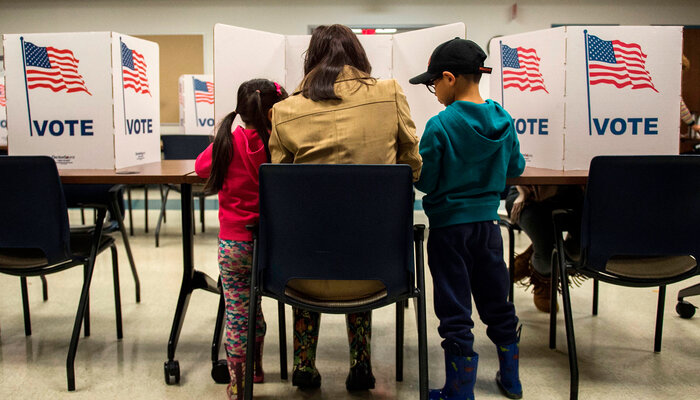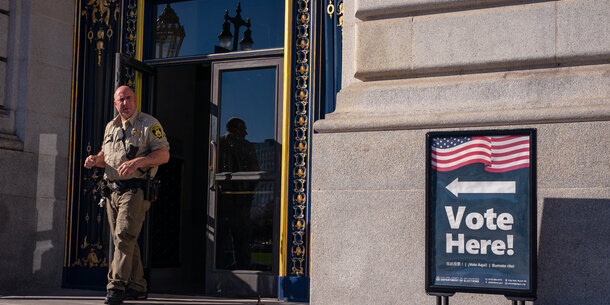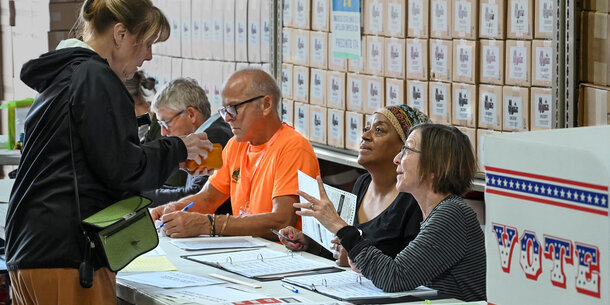What is the Freedom to Vote Act?
The Freedom to Vote Act is major pro-democracy legislation that sets national standards to expand and protect access to the ballot, prevents partisan interference in election administration, prohibits partisan gerrymandering for Congressional districts, and shores up key campaign finance safeguards. Congress came extremely close to passing the bill in 2022, and it was reintroduced in 2023 as S.1 and H.R. 11.
Why does America need the Freedom to Vote Act?
Over the last decade, there have been persistent attempts to restrict the freedom to vote, disproportionately impacting voters of color. The push for voting restrictions gained new intensity in the wake of efforts to overturn the 2020 presidential election. Specifically, the threat of election denialism and efforts to overturn or discredit election results remains a potent force in our politics. It has spilled over into outright harassment and even violence targeting election officials, voters, as well as other partisan efforts to meddle in election administration.
Other long-standing problems, including extreme partisan gerrymandering and a broken campaign finance system, persist. The Supreme Court, far from protecting democracy, has often made matters worse by weakening the Voting Rights Act of 1965.
These challenges require strong solutions, several of which have already been enacted in many states and should be made into baseline national standards. The ability to vote and have your ballot counted should not depend on your zip code. That is why Congress needs to pass the Freedom to Vote Act along with the John Lewis Voting Rights Advancement Act, a companion bill that would restore the Voting Rights Act’s full protections against racial discrimination.
Why keep trying to pass the bill if it failed before?
Just because a bill did not pass last year does not mean that it can’t pass in the future. Lots of major legislation comes up just shy of passing into law before the final push across the finish line. The effort to pass the Voting Rights Act in the 1950s and 60s is a prime example. Pro-democracy allies and advocates are not stopping their work across the country to protect the freedom to vote. Congress should not stop either.
Key congressional leaders have signaled that the Freedom to Vote Act and John Lewis Act are top priorities for them at the next possible opportunity. There are 49 senators on record in support of altering filibuster rules so that bills like these can pass. The president is ready to sign these bills when they reach his desk.
While the pro-democracy movement in our country is strong, the threats are not going away. Democracy is top of mind for voters, and policymakers should be ready to act at the first possible moment.
What does the bill do to remove obstacles to voting?
The bill takes popular voting options, such as early and mail voting, and makes them available to everyone nationwide. These are best practices that already have long and successful histories in the states. The bill requires states to distribute resources equitably, so nobody has to wait more than 30 minutes when voting in person on Election Day. It also requires states to make voter registration easier, including by allowing people to register to vote and update their registration at places like the DMV (automatic voter registration) and allowing them to register when they go to the polls (same day registration).
Further, the bill restores the right to vote for individuals who have returned to their communities after being incarcerated, and it includes important protections for voters with disabilities.
What does Freedom to Vote Act do to protect against election denial?
The bill sets baseline national standards for voting and election processes that provide clear rules for everyone and depoliticize the system. That in and of itself boosts confidence in results and can help blunt the impact of those seeking to interfere with elections.
The bill also creates an enforcement mechanism in cases where votes are not properly counted or where officials who are election deniers refuse to certify results. It puts restrictions on state officials who want to remove election officials for partisan reasons, increases protections against tampering with ballots and other election records, and ensures professional, rigorous audits after elections take place.
What does the bill do to keep elections fair in areas like redistricting and campaign finance?
The Freedom to Vote Act bans partisan gerrymandering by setting out clear, uniform rules that states would have to follow when they draw congressional districts. Those rules include stronger protections for communities of color, opportunities for the public to be involved in the process, and ways to quickly challenge a map that is unfair.
The bill curbs untraceable “dark money” in federal elections by closing loopholes in federal campaign disclosure laws and modernizing those rules to account for online ads. It also tightens rules around super PACs to ensure that they are truly independent of political candidates and parties. It takes steps to improve enforcement of campaign finance laws by the Federal Election Commission. Finally, it provides for more public financing of elections — in the form of small donor matching — which the bill funds without using any taxpayer dollars.
Together these reforms will give ordinary Americans a greater voice in politics and prevent them from being drowned out by the very wealthiest donors.


